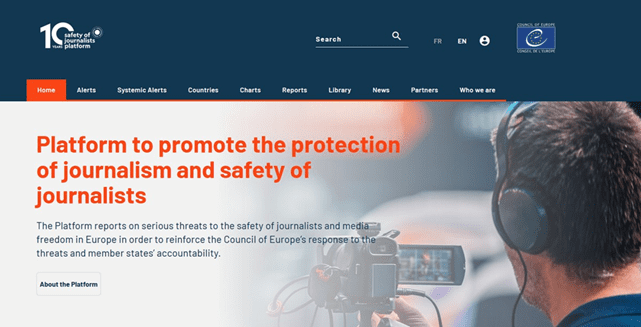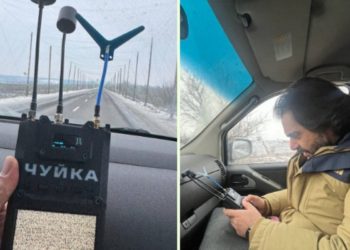On April 2, 2025, the Council of Europe Platform to promote the protection of journalism and safety of journalists celebrates its 10th anniversary since its official launch. During this time, the initiative has become a powerful tool for monitoring threats to media freedom and the protection of journalists in Europe.
The Council of Europe Platform began its work on April 2, 2015. However, its legal establishment took place on December 4, 2014, when leading journalist organizations signed a Memorandum of Understanding with the Council of Europe.
Over the ten years of its operation, the Platform has become a unique mechanism for cooperation between the Council of Europe and a network of reputable international organizations working in the field of press freedom. The main objective of this initiative is to monitor and respond in real-time to threats to journalists and media workers, from harassment and physical attacks to legal and political harassment. The Platform works on the principle of collecting and verifying signals about serious threats to media freedom and the safety of journalists, which are submitted by partner organizations.
“The 10th anniversary of the Council of Europe Platform is an opportunity to note the importance of international solidarity in protecting journalists,” notes Sergiy Tomilenko, the President of the National Union of Journalists of Ukraine (NUJU). “In conditions of war and global challenges to freedom of speech, rapid response mechanisms to threats to journalists acquire special importance. The NUJU actively cooperates with the Council of Europe and the Platform’s partner organizations because the protection of journalists is a shared responsibility of the media community, the state, and international institutions. We consider the Platform an effective tool for drawing attention to the problems of the safety of Ukrainian journalists and increasing pressure on violators of their rights.”
As part of cooperation with the Council of Europe, the NUJU participates in a number of joint initiatives. In particular, in April 2024, the Union joined the Journalists Matter campaign aimed at protecting media workers in wartime. The NUJU also actively disseminates Council of Europe research among the Ukrainian media community and initiates projects to build platforms for cooperation between journalists.
How the Platform Works
Partner organizations are responsible for posting verified information about serious threats to freedom of expression. When submitting a report to the Platform, each partner organization carefully assesses whether the situation poses a serious threat to media freedom, whether the violation is taking place in one of the Council of Europe member states, whether the information is reliable and fact-based, and whether the information is already in the public domain or whether there is consent to its publication. Only after checking against these criteria is the report posted on the Platform.
Council of Europe member states are obliged to act in response to signals and inform the Platform of the measures taken. Thus, the Platform not only documents violations but also creates a mechanism for accountability and encourages states to fulfill their obligations to protect freedom of expression under the European Convention on Human Rights.
Platform partners: united efforts for freedom of speech
The Platform was founded on December 4, 2014 by five leading international organizations in the field of freedom of expression – Reporters Without Borders, the International Federation of Journalists, the European Federation of Journalists, the Association of European Journalists, and Article 19. It was these organizations that signed a Memorandum of Understanding with the Council of Europe, launching a decade-long cooperation.
Over time, other influential associations have joined the Platform’s partner organizations: the Committee to Protect Journalists, the Censorship Index, the International Press Institute, the International Institute for News Safety, the Rory Peck Foundation, the European Broadcasting Union, the International PEN Club, the European Center for Press and Media Freedom, Free Press Unlimited, and the Justice for Journalists Foundation. Today, 15 international non-governmental organizations and journalist associations are partners of the Platform, which significantly expands its capabilities to monitor and respond to violations of press freedom in Europe.
Ukraine and the CoE Platform: current situation
The Council of Europe Platform actively records violations of the rights of journalists in Ukraine, especially in the context of full-scale russian aggression. As of early 2025, the Platform has registered a number of serious incidents related to the safety of Ukrainian journalists.
The most tragic incidents were the killing of Ukrainian journalist Tetiana Kulyk by a russian drone in the Kyiv Region on February 28, 2025, and the death of Reuter’s security advisor Ryan Evans in a missile attack on a hotel in Kramatorsk on September 6, 2024, which also injured three journalists. Russian shelling damaged several media facilities: media offices in Kyiv on February 14, 2025, the Suspilne office in Dnipro on September 27, 2024, and the newsroom of Holos Huliaipillia in the Zaporizhzhia Region on October 31, 2024. A TSN camera crew came under russian shelling near Kharkiv on February 10, 2025, as a result of which the operator was injured.
The platform also records the facts of the detention of journalists and other threats to freedom of speech. In particular, the re-detention of Ukrainian journalist Zhanna Kyseliova by russian occupation forces on October 2, 2024, caused concern. Among the structural problems, concerns were noted regarding the bill that criminalizes the publication of “confidential information” from public databases (January 10, 2025), as well as the issue of editorial independence of the Ukrinform national news agency (June 17, 2024).
Ukraine has already provided official responses to some of these reports, which demonstrates the state’s responsible position on the protection of journalists and freedom of speech.
Financial support and prospects
The CoE Platform relies on voluntary contributions from governments to finance its activities in support of press freedom and the safety of journalists. It currently operates with the financial support of the governments of Belgium, Estonia, Liechtenstein, Luxembourg, the Netherlands, Romania, the Slovak Republic, Slovenia, Switzerland, and the United Kingdom.
Over the past ten years, the Council of Europe Platform has become not only a monitoring tool but also an advocacy and reporting mechanism, providing an informed overview of trends and challenges to the safety of journalists and media freedom in Europe. The Platform’s annual reports and data inform the Council of Europe’s policies and actions, providing a basis for broader efforts to counter threats to press freedom.
The Platform continues to play a key role in protecting journalists and freedom of expression in Europe, especially in the face of new challenges, including armed conflict, the spread of disinformation, and pressure on independent media.
NUJU Information Service

 THE NATIONAL UNION OF
JOURNALISTS OF UKRAINE
THE NATIONAL UNION OF
JOURNALISTS OF UKRAINE
















Discussion about this post